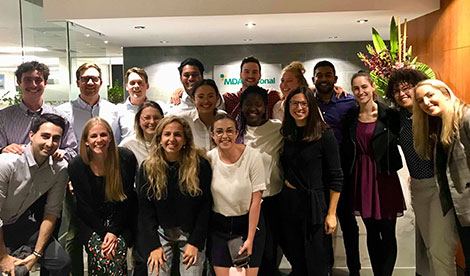

Blog

Learning to be a ‘great’ doctor
Monday December 9, 2019
As I sit to write my final column for Medicus as MSAND President, it has been nice to take stock of what has been a most enjoyable year (minus the exams we are sitting by the time this is published) and reflect upon what I believe makes a great doctor.
As a veteran of 12 months’ clinical experience, it means aspiring to be like the great doctors we have had on clinical placement – ruthless in the pursuit of knowledge all whilst staying kind, caring and empathetic. It is these characteristics that should define us for the four years at medical school and more importantly, for the 40 or so years after we graduate.
I get to see this ruthless pursuit of knowledge every day in the library as students pour over resources, transitioning from learning about myelodysplastic disorders and pathological causes of neonatal jaundice to understanding the important public health reasons behind the cervical screening test.
The great thing about medicine is that it is fabulously interesting but there is also a lot to learn – significantly, how to manage our own personal battles with never being able to know everything. This lends itself perfectly – as medical students and then, doctors – to the issue of self-kindness.
According to the 2019 Hospital Health Check survey carried out by the AMA (WA) Doctors in Training Committee, 23 per cent of interns, 32 per cent of RMOs and 42 per cent of registrants feel burnt out. We need to look after ourselves before we can look after our patients.
With medicine becoming more and more competitive, we can choose to have a scorched-earth approach and leave everyone behind, or we can choose to take people along with us. The latter could involve a simple ‘Hi’ to someone, and asking how they are because you don’t know the last time they were asked that.
As a medical student, empathy means realising there is a patient in every room of a consult and understanding their story.
As a doctor, empathy means realising there is a patient in every room of a consult and understanding their story but also bearing in mind that there is often a student who is learning from them too.
Every doctor should always remember how they too were once that student, trembling in their boots, and how they have the power to shape a student’s memory. It can be something as simple as getting students involved, providing constructive feedback and taking a genuine interest.
As medical students, we can be the change agents, helping to contribute to this changing culture in the medical profession.
Vote of Thanks
I would like to end my final MSAND column with thanks and congratulations. It has been a privilege to be MSAND President for 2019 and I would like acknowledge those in the committee who made the year possible. To Tessa, Shaun, Peter, Kate, Jarryd, Chrissie, Brittney, Joe, Simone, Poppy, Sylvia, Matty, Georgia, Justin, Michaela, Hussey, Monica, Nedos, Reesha, Seth, Breanna and McKendrick: thank you for your hard work and dedication to improving the medical student experience at Notre Dame Fremantle.
I also take great pleasure in welcoming the new President of MSAND Breanna Hollow and her committee for 2020 (pictured). With Breanna’s passion, intellect and kindness at the helm and supported by the wonderful committee, MSAND’s best days lie ahead.
Finally, I would like to thank the AMA (WA) for the opportunity to let MSAND contribute to Medicus. In my articles over the past year, I have highlighted some important issues such as self-care, mental health and burnout, the importance of generalist teaching as well as kindness and inclusivity in an era of growing competitiveness. I hope I have shed light on these issues in some small way, and trust the AMA (WA) through its advocacy will continue to address them.

